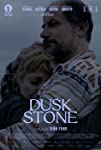Eye For Film >> Movies >> Dusk Stone (2021) Film Review
Dusk Stone
Reviewed by: Amber Wilkinson

The fantastical is folded firmly into the everyday in this study of grief and connection from cinematographer and director Iván Fund. His background in DoP work is evident from the start as we race along the beach watching tracks in the sand fall away behind us - shot by DoP Gustavo Schiaffino - with the motion taking on an almost hypnotic quality after a while. That sense of falling under the spell of something is also signposted by a heavy duty score from Francisco Cerda, and echoes through a film that is big on mood in general even if its structure and overall storytelling are weak by comparison.
Just along the beach from the shoreline, live Greta (Mara Bestelli), Bruno (Marcelo Subiotto) and their young son Denis (Jeremias Mateo Kuharo), who like many kids his age loves his handheld computer game, where he is busily helping the kaiju he created to evolve. "I gave him a gemstone," he tells his dad proudly. That's his little world, just one of the personal universes that are occupied in the film and which we catch a glimpse of through camerawork that pays attention to slight shifts in facial expression as Bruno and Greta try to work through the conflicting emotions of grief.

The film unfolds in odd little moments, including one in which, early in the film, Denis disappears leaving his parents alone to mourn. Time passes, unseen, which can certainly be true of grief, and when we next see the pair, an old friend of Greta's Sina (Maricel Álvarez) has come to help them pack up and leave, with the guidance of local entrepreneur Genaro (Alfredo Castro, in an oddly perfunctory role for him). In the background, meanwhile, is a platform, unwelcome in this town - which despite its chilly look, is named Pretty Bay - and which has fallen into disuse after something "ate" the cables, leading locals to speculate about a sort of Loch Ness monster at sea.
Fund is definitely striving to say something profound here about the nature of imagination as a way of helping to cope with loss, as Bruno becomes increasingly convinced that there's something to this myth and Greta, potentially, starts to buy in. Despite this, everything seems underwritten, both in terms of character and plot development. The ingredients are present and correct but not quite in the right combination. Horror movies are littered with more complex examples of the "monsters" of grief and acceptance and though Fund has certainly achieved a lot in terms of melancholy tone, the narrative stubbornly refuses to coalesce. He's so intent on building on hints of monsters here and rumours of things there that he also forgets to fully flesh out his characters so that even accounting for their grief they, too, seem like a whisper of what could have been. More script evolution is needed.
Reviewed on: 02 Sep 2021
















